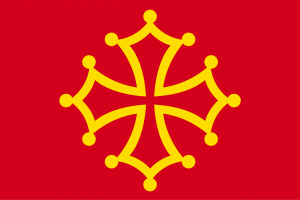Language/Occitan-post-1500/Grammar/Adjectives
Hi Occitan (post 1500) learners! 😊
In this lesson, we will be learning about adjectives in Occitan (post 1500) – how to use them, where to place them, and more. Adjectives are an important part of any language, and mastering them will help you better express yourself and make your speech more nuanced. We will also be looking at some interesting facts about Occitan (post 1500) language and culture. So, let's get started!
Don't forget to use the Find native speakers and ask them any questions you may have about Occitan (post 1500). To improve your Occitan (post 1500) Grammar, you can also use the Polyglot Club website.
What are adjectives?[edit | edit source]
An adjective is a word that describes or modifies a noun or pronoun. Adjectives can describe a noun's size, shape, color, age, quantity, and many other attributes. In Occitan (post 1500), adjectives usually come after the noun they describe. For example:
| Occitan (post 1500) | Pronunciation | English |
|---|---|---|
| Una flor roja | /una fluʁ ˈrɔd͡ʒa/ | A red flower |
| Lo quite breç | /lu ˈkito ˈbɾɛt͡ʃ/ | The short shirt |
| La polita mòstra | /la puˈlita ˈmɔstɾa/ | The beautiful demonstration |
As you can see in the above examples, adjectives come after the noun they describe. However, you may sometimes see adjectives before the noun in formal or poetic writing.
Occitan (post 1500) Adjective Agreement[edit | edit source]
In Occitan (post 1500), adjectives usually agree in gender and number with the noun they are modifying. This means that if the noun is feminine, the adjective must also be feminine, and if the noun is plural, the adjective must also be plural. For example:
| Occitan (post 1500) | Pronunciation | English |
|---|---|---|
| Un gat negre | /un gat ˈnɛɡɾe/ | A black cat |
| Una gata negra | /una ˈɡata ˈnɛɡɾa/ | A black cat |
| Mos catz negres | /mus kats ˈnɛɡɾes/ | My black cats |
As you can see in the above examples, the endings of the adjectives change to agree with the noun they modify. The masculine adjective "negre" becomes "negra" when modifying a feminine noun, and "negres" when modifying plural nouns.
Formation of Comparative and Superlative Adjectives[edit | edit source]
Occitan (post 1500) forms comparative and superlative adjectives similarly to Romance languages like Spanish or Italian. Here's how to form comparative and superlative adjectives in Occitan (post 1500):
- To form the comparative of adjectives, add "m'èi" (meaning "more") before the adjective. For example:
| Occitan (post 1500) | Pronunciation | English |
|---|---|---|
| M'èi grand | /mɛɪ ɡɾan/ | More big |
| M'èi bon | /mɛɪ bɔn/ | More good |
| M'èi politic | /mɛɪ puliˈtit/ | More political |
- To form the superlative of adjectives, add "lo maishant" (meaning "the most") before the adjective. For example:
| Occitan (post 1500) | Pronunciation | English |
|---|---|---|
| Lo maishant grand | /lu majˈʃant ɡɾan/ | The biggest |
| Lo maishant bon | /lu majˈʃant bɔn/ | The best |
| Lo maishant politic | /lu majˈʃant puliˈtit/ | The most political |
Interesting facts about Occitan (post 1500)[edit | edit source]
- Occitan (post 1500) is not a dialect of French – it is a separate Romance language, just like Spanish, Portuguese, or Italian.
- Occitan (post 1500) was once spoken in a large part of France, as well as in Catalonia, Valencia, and parts of Italy.
- Occitan (post 1500) has several dialects, including Gascon, Languedocien, and Provençal.
- Occitan (post 1500) has a rich literary tradition, and was the language of troubadours, who created songs and poetry in the language in the Middle Ages.
Let's have a dialogue to see some of these adjectives in use:
- Person 1: Aquò es un bèl luec. (This is a beautiful place.)
- Person 2: M'agrada la natura. (I like nature.)
- Person 1: Òc, la natura es grandiosa! (Yes, nature is grandiose!)
- Person 2: Es vert. (It's green.)
- Person 1: E aquela flor es plan bèla. (And that flower is very beautiful.)
- Person 2: Òc, es una flor rosada. (Yes, it's a pink flower.)
➡ If you have any questions, please ask them in the comments section below.
➡ Feel free to edit this wiki page if you think it can be improved. 😎

